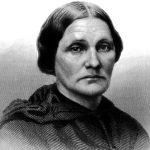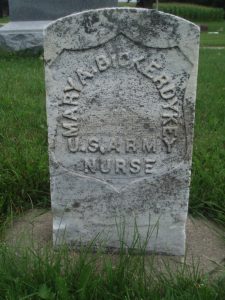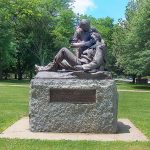 Nurses are the cornerstone of medicine in many cases. Yes, we must have doctors, but nurses are the support system that allows doctors to do their jobs. One such example was a woman named Mary Ann Bickerdyke. She was born on July 19, 1817 in Knox County, Ohio, to Hiram and Annie (Rodgers) Ball. She was married in 1847 to Robert Bickerdyke. The couple and their family moved to Galesburg, Illinois. After her infant daughter died suddenly, she vowed to learn more about medicine, studying herbal medicine at Oberlin College. Mary Ann was widowed in 1859. She was alone and the mother of two sons, who were in their adolescent years.
Nurses are the cornerstone of medicine in many cases. Yes, we must have doctors, but nurses are the support system that allows doctors to do their jobs. One such example was a woman named Mary Ann Bickerdyke. She was born on July 19, 1817 in Knox County, Ohio, to Hiram and Annie (Rodgers) Ball. She was married in 1847 to Robert Bickerdyke. The couple and their family moved to Galesburg, Illinois. After her infant daughter died suddenly, she vowed to learn more about medicine, studying herbal medicine at Oberlin College. Mary Ann was widowed in 1859. She was alone and the mother of two sons, who were in their adolescent years.
Widowed just two years before the Civil War began, she supported herself and her sons by practicing as a “botanic physician” in Galesburg. When a young Union volunteer physician wrote home about the filthy, chaotic military hospitals at Cairo, Illinois, the citizens of Galesburg collected $500 worth of supplies and selected Bickerdyke to deliver them. She left her sons with a neighbor, and after seeing the horrible conditions for herself, Bickerdyke decided that she was needed there, so she stayed as an unofficial nurse. Her never ending energy, and her dedication made her just the heroine the Union soldiers needed in those awful war years. She organized the hospitals and cleaned up the filth that served only to breed germs, and in doing so, she gained the respect and appreciation of Ulysses S. Grant.
While there, she worked alongside another famed Civil War Nurse, Mary J. Stafford. When Grant’s army moved down the Mississippi River, Bickerdyke went too, becoming the Chief of Nursing and setting up hospitals where  they were needed. Bickerdyke’s goal during the Civil War was to more efficiently care for wounded Union soldiers. She insisted on cleanliness, was dedicated to improving the level of care, and unafraid of stepping on male toes. That, in itself, was almost unheard of in that era. She was adamant about scrubbing every surface in sight, reported drunken physicians, and on one occasion ordered a staff member, who had illegally appropriated garments meant for the wounded, to strip. Though she antagonized male physicians, staff, and soldiers alike, in the name of better patient care, she won most of her battles…a good thing for the wounded soldiers.
they were needed. Bickerdyke’s goal during the Civil War was to more efficiently care for wounded Union soldiers. She insisted on cleanliness, was dedicated to improving the level of care, and unafraid of stepping on male toes. That, in itself, was almost unheard of in that era. She was adamant about scrubbing every surface in sight, reported drunken physicians, and on one occasion ordered a staff member, who had illegally appropriated garments meant for the wounded, to strip. Though she antagonized male physicians, staff, and soldiers alike, in the name of better patient care, she won most of her battles…a good thing for the wounded soldiers.
Union General William T. Sherman was especially fond of the volunteer nurse who followed the western armies. It is said that she was the only woman he would allow in his camp. When his staff complained about the outspoken, insubordinate female nurse who constantly disregarded the army’s red tape and military procedures, Sherman threw up his hands and exclaimed, “Well, I can do nothing for you, she outranks me.” Running roughshod over anyone who stood in the way of her self-appointed duties, when a surgeon questioned her authority to take some action, she replied, “On the authority of Lord God Almighty, have you anything that outranks that?” I guess Sherman was right when he said that she outranked him.
To the wounded soldiers, Bickerdyke was an angel. They affectionately called her “Mother” Bickerdyke, and she called them her “boys.” The soldiers would cheer here when she appeared. She was more loved than the celebrities of our day are for some fans. During the war, she worked closely with Eliza Emily Chappell Porter of the Northwest Sanitary Commission, worked on the first hospital boat, helped build 300 hospitals and aided the wounded on 19 battlefields including the Battle of Shiloh, the Battle of Vicksburg, and Sherman’s March to the  Sea. When the war was over, she rode at the head of the XV Corps in the Grand Review in Washington at General William T. Sherman’s request. Afterwards, she worked for the Salvation Army in San Francisco, and became an attorney, helping Union veterans with legal issues. Later, she ran a hotel in Salina, Kansas for a time before retiring to Bunker Hill, Kansas. She received a special pension of $25 a month from Congress in 1886. She died peacefully after a minor stroke November 8, 1901. Her remains were transported back to Galesburg, Illinois and she was interred next to her husband at the Linwood Cemetery. In memory of Bickerdyke’s selflessness, a statue of her was erected in Galesburg, Illinois. Two ships…a hospital boat, a liberty ship, and a cemetery in Kansas were named after her.
Sea. When the war was over, she rode at the head of the XV Corps in the Grand Review in Washington at General William T. Sherman’s request. Afterwards, she worked for the Salvation Army in San Francisco, and became an attorney, helping Union veterans with legal issues. Later, she ran a hotel in Salina, Kansas for a time before retiring to Bunker Hill, Kansas. She received a special pension of $25 a month from Congress in 1886. She died peacefully after a minor stroke November 8, 1901. Her remains were transported back to Galesburg, Illinois and she was interred next to her husband at the Linwood Cemetery. In memory of Bickerdyke’s selflessness, a statue of her was erected in Galesburg, Illinois. Two ships…a hospital boat, a liberty ship, and a cemetery in Kansas were named after her.


One Response to Mother Bickerdyke